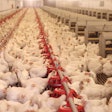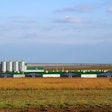News that English bioethanol refinery and animal feed producers Vivergo are planning to open a new plant will ease the pressure on hard-pressed farms reliant on imported animal feed, according to the National Farmers’ Union.
The new plant in the Humber Estuary, which opened on July 8, will provide an important home for United Kingdom wheat, creating around 500,000 tons of animal feed per year and reducing United Kingdom reliance on imports of soybeans from the Americas, while also providing an alternative to fossil fuels through its production of bio-ethanol.
The news comes after both the arable and livestock sectors had a difficult a year, which included a below average harvest, the temporary mothballing of North East ethanol plant Ensus and high animal feed prices as a result of the poor weather across the country.
“It’s a boost to farmers to hear that Vivergo will be maximizing their potential capacity in the run up to harvest,” said The National Farmers’ Union combinable crops board member Brett Askew. “The industry’s troubles have been well documented over the past year and the latest noises emerging from Brussels on Common Agricultural Policy reform have done little to lighten the mood.
“Multiple markets for our produce allows individual farmers the certainty we need to do what we do best and produce to satisfy market demand for food, feed and fuel. We have a responsibility to help drive a sustainable increase in production and the biofuels market can play a role in delivering the necessary economic certainty on farm that will help us all achieve this goal.”
According to Askew, policy makers must take a close look at the benefits collaboration between the agricultural industry and biofuels sector can deliver and provide the consistency in policy making that will allow farmers to not only sustainably feed the country, but also contribute towards a changing energy sector.












